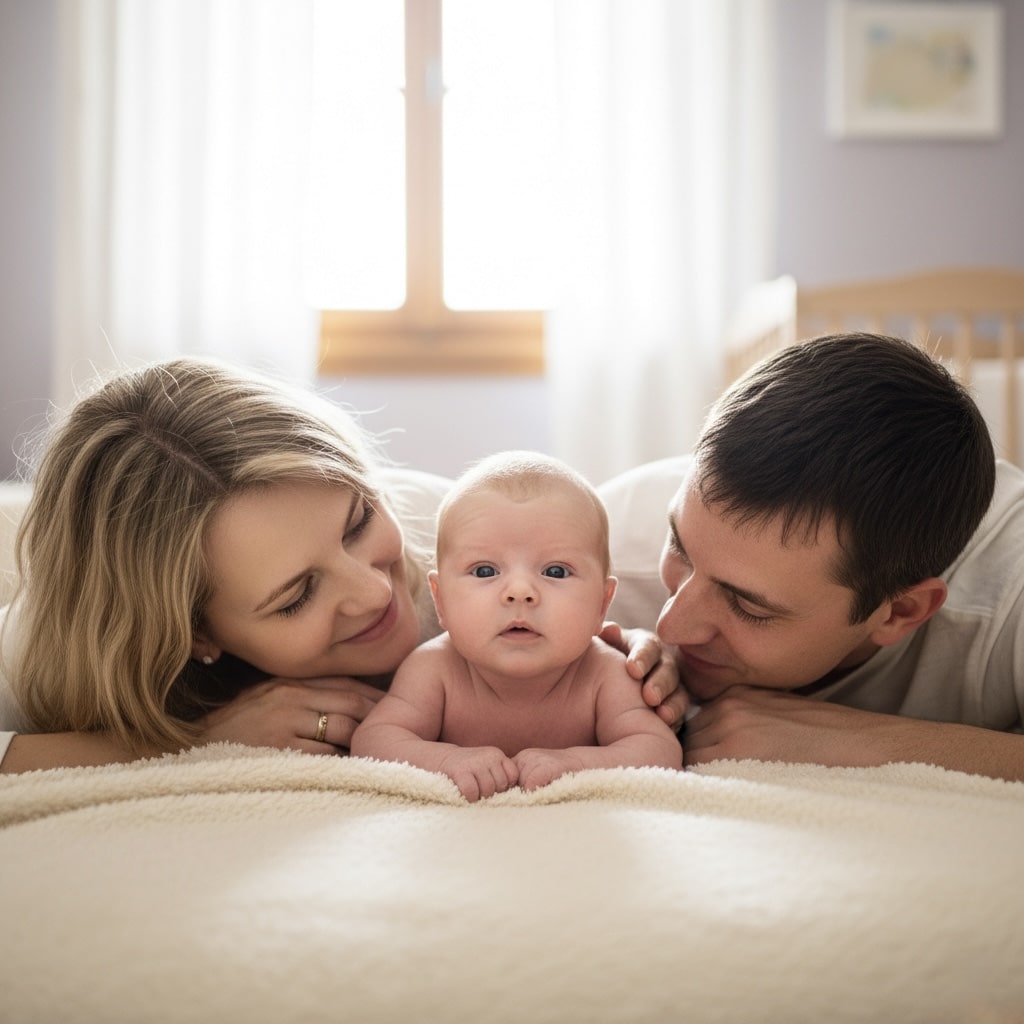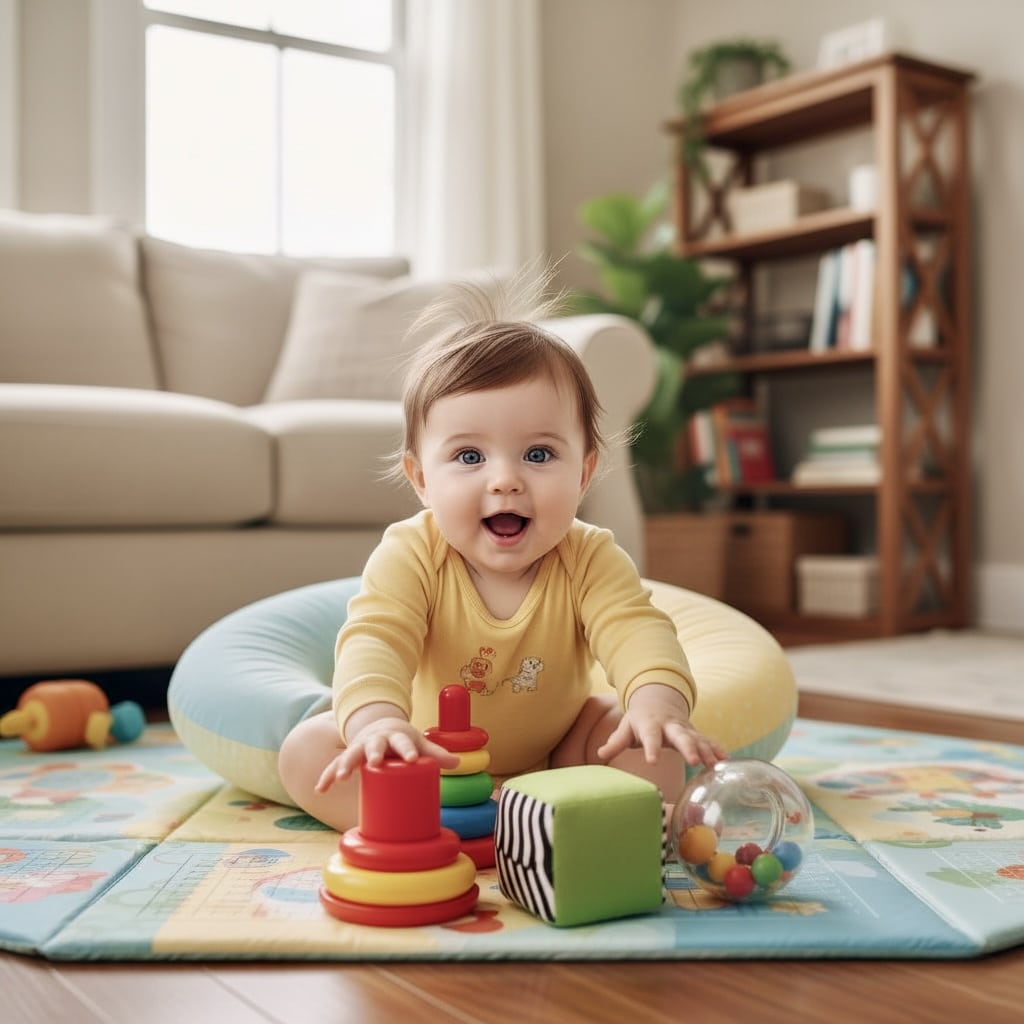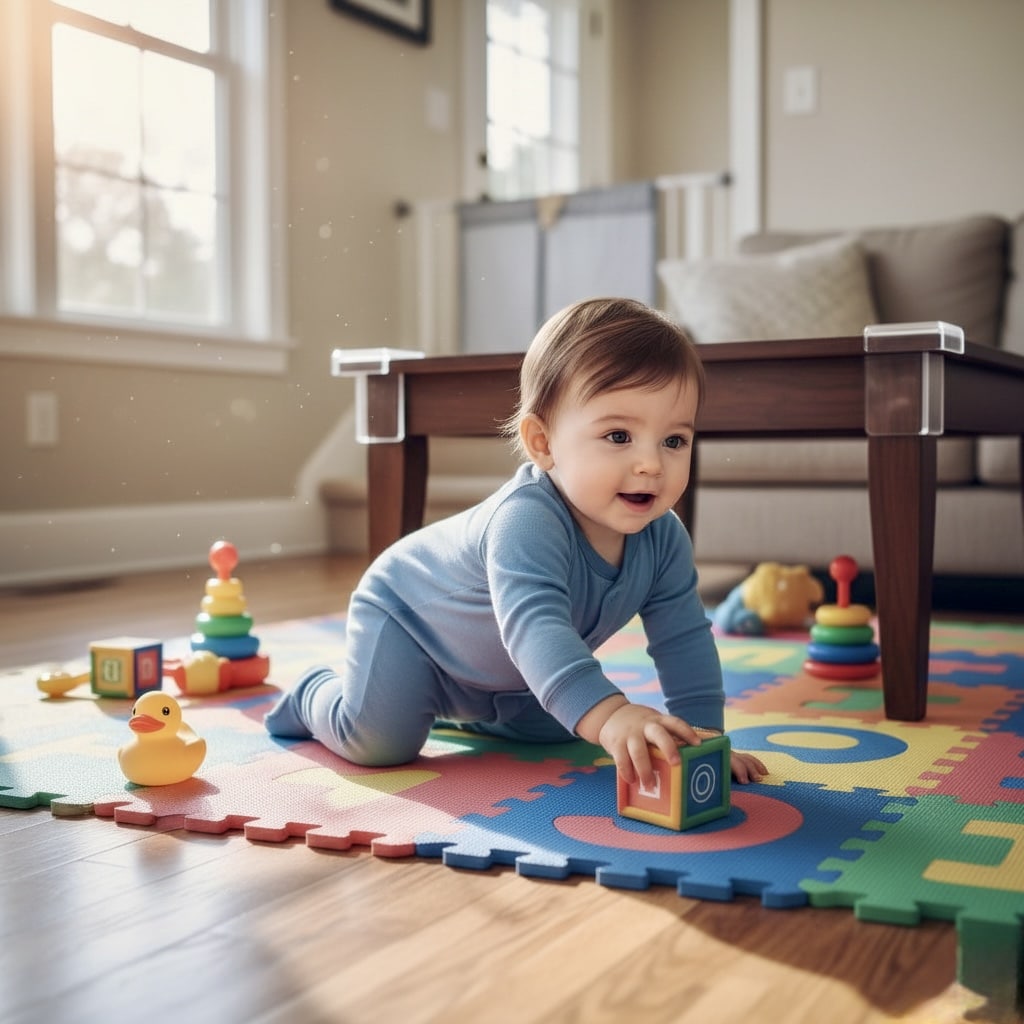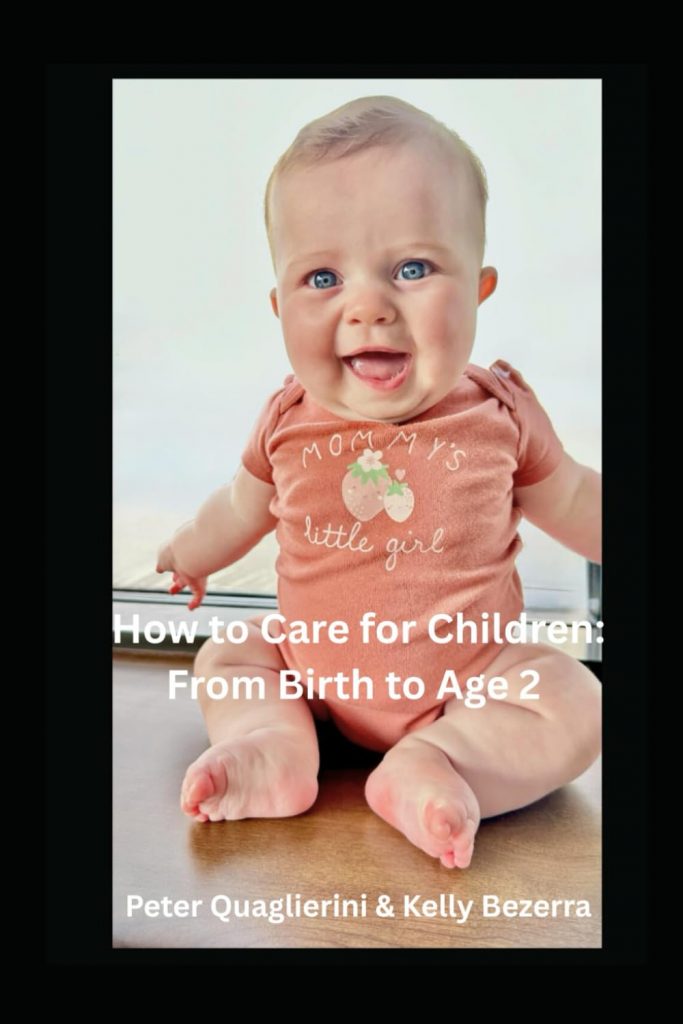Baby milestones are exciting markers of growth in your child’s first year, from first smiles to first steps, showing how quickly their development unfolds.
Your baby’s first year: Understanding baby milestones first year helps parents full of incredible changes that will amaze and delight you every day. From the first smile to the first steps, each milestone marks an important stage in development that reflects the remarkable growth happening in your little one’s brain and body. While every baby is unique and may reach milestones at their own pace, understanding common developmental stages helps parents track growth and support their child’s progress with confidence and appropriate expectations. Tracking baby milestones first year provides parents with a roadmap for understanding their infant’s development and helps identify when additional support might be beneficial.
Baby Milestones First Year: Month by Month Overview
Pediatric developmental milestones are evidence-based indicators used by health practitioners and parents to follow a child’s development over several domains: physical development, cognitive development, social development, and emotional development. The American Academy of Pediatrics highlights that developmental milestones are guidelines and not timelines because typical development happens within ranges and not on precise dates.
Science reveals that infants’ brains generate a million neural connections every second within their first year. This fastpaced building of the brain powers the development of new behaviors and skills that we observe as milestones. This perspective allows parents to better understand and appreciate not only what their baby is doing, but also how much complexity is occurring at a deeper level.
Understanding baby milestones first year requires recognizing that each developmental domain (physical, cognitive, social, and emotional) progresses simultaneously and interdependently.
Baby Development in Months 1–2: Early Awareness
During the first two months, your baby is adjusting to life outside the womb while beginning to engage with the world around them. This period focuses on establishing basic physiological regulation and early social connections.

Key Developmental Achievements:
- Visual development: Begins to recognize faces and voices, particularly those of primary caregivers
- Social engagement: Starts making intentional eye contact, especially during feeding and quiet alert periods
- Motor skills: Lifts head slightly during tummy time, showing early neck muscle development
- Sensory processing: Responds to sounds with movement, startling, or changes in crying patterns
- Sleep patterns: Begins to establish longer sleep periods, though still irregular
Your Role as Parent: Offer lots of face-to-face interaction, speaking softly and maintaining eye contact to build connection and trust. This early bonding period establishes the foundation for all future emotional and social development. Respond consistently to your baby’s cues for feeding, sleeping, and comfort to help them develop a sense of security and predictability.
Month 3–4: Emerging Social and Physical Development
The second quarter of your baby’s first year brings exciting developments in social interaction and physical capabilities. These baby milestones first year achievements. This is often when parents first see their baby’s personality beginning to emerge. During this phase of baby milestones first year, parents notice significant changes in their infant’s ability to interact and communicate.
Key Developmental Achievements:
- Social milestones: Starts to smile socially in response to interaction, not just reflexively
- Visual tracking: Follows objects with eyes in smooth movements, showing improved coordination
- Physical strength: Pushes up on arms during tummy time, demonstrating core and arm muscle development
- Communication: Begins to coo and make gurgling sounds, the first steps toward intentional communication
- Hand-eye coordination: Shows increased interest in hands and begins bringing them to mouth
Your Role as Parent: Use toys with high contrast colors and patterns to encourage visual development. Talk, sing, and respond to your baby’s vocalizations to promote language development. Provide regular tummy time to strengthen neck, shoulder, and core muscles essential for future motor milestones.
Month 5–6: Rolling and Reaching Milestones
The middle of the first year brings dramatic improvements in motor skills and increased interaction with the environment. Babies become much more active participants in their world. Reaching the midpoint of baby milestones first year means your infant is developing greater physical independence and purposeful movement.
Baby Developmental Achievements:
- Gross motor skills: Rolls from tummy to back and eventually back to tummy, showing trunk control
- Fine motor development: Reaches for and successfully grabs toys, demonstrating hand-eye coordination
- Postural control: Begins sitting with support, showing improved core strength and balance
- Sensory exploration: Shows increased interest in different textures, temperatures, and materials
- Social awareness: Recognizes familiar people and may show stranger anxiety
- Sleep development: May begin sleeping for longer stretches at night

Your Role as Parent: Provide safe floor space for movement and exploration. Offer a variety of safe toys with different textures, weights, and sounds to encourage sensory development. Begin introducing solid foods if recommended by your pediatrician, allowing baby to explore new tastes and textures.
Baby Growth Stages 7–9: Independence and Exploration

The third quarter brings exciting developments in independence and mobility. Babies become increasingly curious about their environment and develop new ways to explore it. During this phase of baby milestones first year.
This mobility marks one of the most dramatic transformations in baby milestones first year, as infants transition from stationary observers to active explorers.
Key Developmental Achievements:
- Sitting milestone: Sits without support for extended periods, freeing hands for play
- Mobility begins: Begins to crawl, scoot, or find other creative ways to move around
- Language recognition: Responds consistently to their name and familiar words
- Social play: Enjoys interactive games like peek-a-boo and shows delight in mirror play
- Object permanence: Begins to understand that objects exist even when out of sight
- Fine motor refinement: Develops pincer grasp, allowing for more precise manipulation
Your Role as Parent: Encourage movement in a safe, baby-proofed environment. Use games that promote social and emotional skills while supporting cognitive development. Respond enthusiastically to your baby’s attempts at communication to encourage continued language development.
Month 10–12: First Words and Independent Movement
The final quarter of the first year often brings the milestones parents eagerly anticipate: first words and first steps. This period represents the culmination of a year’s worth of skill building.
Key Developmental Achievements:
- Gross motor mastery: Pulls to stand using furniture, may take first independent steps
- Language emergence: Says first recognizable words like “mama,” “dada,” or simple family terms
- Comprehension: Understands simple instructions like “no,” “come here,” or “wave bye-bye”
- Imitation skills: Copies sounds, actions, and gestures with increasing accuracy
- Social sophistication: Shows preferences for certain people, toys, and activities
- Problem-solving: Demonstrates early problem-solving skills in play and exploration

The final months of baby milestones first year showcase the remarkable cumulative progress achieved through consistent development across all domains.
Baby Milestones first year: Toddler Safety: Essential Tips to Keep Your Child Safe and Secure
Your Role as Parent: Celebrate progress with enthusiastic praise while maintaining realistic expectations. Respond to your baby’s communication attempts to build language skills and confidence. Provide opportunities for safe cruising and walking practice while baby-proofing your home thoroughly.
Documenting Your Baby’s Milestone Journey
Capturing and recording your baby’s milestones creates both practical benefits and treasured memories that you’ll appreciate for years to come. Creating a comprehensive record of baby milestones first year helps parents track patterns, share accurate information with healthcare providers, and preserve precious memories of their infant’s rapid development.
Creating a Milestone Record: Maintain a simple journal or digital log noting when significant developments occur. Include not just the “what” and “when,” but also the “how” and context surrounding each achievement. For example, rather than simply noting “first steps on May 15,” record “took three independent steps from couch to daddy while laughing with excitement.” These details bring the memory to life and provide rich context you might otherwise forget.
Documentation of baby milestones first year serves multiple purposes beyond nostalgia, providing valuable developmental data for pediatric assessments.
Photography and Video Documentation: Take regular photos and short videos showing your baby’s development. Monthly milestone photos taken in the same location provide a powerful visual timeline of growth. Videos are particularly valuable for capturing movement milestones like crawling, cruising, and first steps, as well as early language attempts and social interactions. These recordings become precious family history and can also be useful if developmental concerns arise and you need to show healthcare providers examples of your baby’s abilities.
Baby Books and Apps: Whether you prefer traditional baby books or modern milestone tracking apps, having a dedicated system makes documentation consistent and comprehensive. Many apps offer reminders for upcoming typical milestones, developmental activity suggestions, and easy photo integration. Choose whatever method you’ll actually use consistently, perfect documentation in an unused baby book helps no one.
Sharing with Healthcare Providers: Bring your milestone records to well-child visits. This information helps pediatricians assess development comprehensively and can highlight patterns you might not notice day to day. If you have specific concerns, having concrete examples with dates provides much more useful information than vague recollections.
Navigating Social Comparison and Parental Pressure
The pressure to compare baby milestones with other children can undermine the joy of your baby’s unique developmental journey. Remembering that baby milestones first year represent guidelines rather than competitive achievements helps parents enjoy their infant’s progress without unnecessary stress.
The Comparison Trap: Social media and parenting groups often showcase early achievers, creating unrealistic expectations and unnecessary anxiety. Remember that parents typically share exceptional achievements, not typical development, creating a skewed perception of “normal.” A baby walking at 9 months gets celebrated widely, while the equally normal 14-month walker goes unmentioned, creating false impressions about typical timelines.
Understanding Statistical Ranges: When resources say “most babies walk by 12 months,” many parents mistakenly believe this means their baby should walk at exactly 12 months. In reality, developmental ranges are wide, walking typically occurs anywhere from 9 to 18 months. “By 12 months” means the statistical midpoint, not a deadline. Your baby walking at 11 months isn’t “advanced” nor is walking at 15 months “delayed,” both fall within the broad spectrum of normal development.
When evaluating baby milestones first year, focus on your child’s individual trajectory rather than comparing against peers or statistical averages.
Focusing on Your Child’s Progress: Instead of comparing your baby to others, track their individual developmental trajectory. Is your baby making steady progress in their own timeline? Are they building new skills and capabilities? Are they happy, healthy, and engaged? These questions matter far more than whether your neighbor’s baby crawled two months earlier.
Responding to Unwanted Advice: Well-meaning relatives and friends often offer unsolicited milestone-related advice: “He should be walking by now,” or “She’s not talking yet?” Prepare simple responses like “Our pediatrician is pleased with her development,” or “Every baby develops at their own pace.” You don’t owe anyone detailed explanations about your baby’s development.
Protecting Your Parental Confidence: Trust your instincts and your pediatrician’s guidance over casual opinions. Your baby’s development is a unique journey influenced by genetics, temperament, and environment. Avoid milestone-driven parenting that prioritizes achievement over relationship and joy. The goal isn’t to create the earliest walker or talker, but to support your baby’s development while building a secure, loving relationship that provides the foundation for all future learning and growth.
Red Flags in Baby Milestones and When to Seek Help
Monitoring baby milestones first year includes recognizing both typical variations and signs that may warrant professional evaluation.
While development varies widely among babies, certain delays may warrant professional evaluation:
Potential Concerns by 6 Months:
- No social smiles or eye contact
- Doesn’t respond to sounds or name
- Cannot hold head steady
- Shows extreme muscle stiffness or floppiness
Potential Concerns by 12 Months:
- No crawling or attempts at mobility
- No words or word attempts
- Doesn’t respond to simple instructions
- Loss of previously acquired skills
Always consult your pediatrician if you have concerns about your baby’s development. Early intervention services can provide tremendous support when needed.
Supporting Baby Development with Daily Habits
Supporting baby milestones first year requires consistent daily habits that nurture development across all domains.
Creating an Enriching Environment:
- Provide age-appropriate toys that encourage exploration
- Read daily to promote language development
- Ensure adequate tummy time for motor development
- Maintain consistent routines for security and predictability
Nurturing Emotional Development:
- Respond consistently to your baby’s cues
- Provide comfort during distress
- Celebrate achievements with enthusiasm
- Create opportunities for social interaction
Promoting Physical Development:
- Encourage movement and exploration in safe spaces
- Provide varied sensory experiences
- Support but don’t rush milestone achievement
- Ensure proper nutrition for healthy growth
The Importance of Individual Variation
Remember that developmental milestones represent ranges, not deadlines. Some babies walk at 9 months, others at 15 months—both are completely normal. Factors influencing development include:
- Genetics: Family patterns often influence timing
- Temperament: Some babies are naturally more cautious or adventurous
- Environment: Rich, supportive environments promote development
- Health factors: Premature babies may reach milestones on adjusted timelines
These factors make each journey through baby milestones first year unique and personalized to your infant’s individual characteristics.
Conclusion: Celebrating the Journey
Baby milestones are not a race—they’re a beautiful journey of growth that unfolds uniquely for each child. Every smile, every reach, every tentative step represents your baby’s remarkable development and your role as their first and most important teacher.
Celebrate each achievement, support challenges with patience and encouragement, and remember that love, attention, and responsive caregiving are your baby’s most powerful tools for success. The bond you build through supporting their development will last a lifetime and provides the foundation for all future learning and growth.
Embracing the individuality of baby milestones first year allows parents to celebrate progress authentically while maintaining realistic expectations.
Trust in your baby’s natural development process while staying attuned to their individual needs and progress. This first year is just the beginning of an incredible journey of discovery for both you and your child. The baby milestones first year journey.
NOTE: The information in this post is based on guidelines and research from leading health institutions including the American Academy of Pediatrics, CDC, and other recognized medical authorities.”
- American Academy of Pediatrics (AAP) – pediatric guidelines and recommendations.
- Centers for Disease Control and Prevention (CDC) – health statistics and safety data.
- World Health Organization (WHO) – global health and development standards.
- National Institutes of Health (NIH) – medical research and health information.
Looking for comprehensive guidance on caring for your baby? Our book ‘How to Care for Children: From Birth to Age 2’ combines professional nanny experience with evidence based child development research. Written by Kelly and Peter, this guide provides clear, reliable advice rooted in real world childcare. Available in English, Spanish, and Portuguese on Amazon.
Click the link below your preferred language to get your copy!

1. What are the most important baby milestones in the first year?
The most important baby milestones first year include the first social smile (2 to 3 months), rolling over (4 to 6 months), sitting without support (6 to 8 months), crawling (7 to 10 months), standing up (9 to 12 months), and first words (10 to 14 months). Each baby reaches these baby milestones first year at their own pace, and variations of a few months are completely normal. What matters most is observing continuous progress across all developmental areas: physical, cognitive, social, and emotional development throughout your baby’s first year.
2. When should I be concerned about delayed baby milestones?
You should consult your pediatrician if, by 6 months, your baby doesn’t make eye contact, show social smiles, or hold their head steady. By 12 months, be concerned if there are no crawling attempts or mobility efforts, no words or attempts to speak, inability to follow simple instructions, or loss of previously acquired skills. Remember that premature babies follow adjusted timelines for baby milestones first year. Early intervention is highly effective when needed, so it’s always better to discuss concerns with a healthcare professional rather than waiting.
3. How can I support my baby’s development during the first year?
Support your baby milestones first year through responsive and consistent interaction. Provide plenty of tummy time to strengthen muscles, read daily to promote language development, offer age-appropriate toys that encourage sensory exploration, and maintain predictable routines for security. Most importantly, respond to your baby’s needs with love and attention, create a safe environment for exploration, and celebrate each achievement enthusiastically. The strong emotional bond you build is fundamental to all aspects of development and helps your baby reach their milestones with confidence.
4. Are baby milestones the same for all children?
No, baby milestones first year represent broad ranges, not rigid deadlines. Some babies walk at 9 months, others at 15 months, and both are completely normal. Factors like genetics, temperament, environment, and health history influence timing of baby milestones first year. More cautious babies may take longer to walk, while babies focused on motor skills might talk slightly later. What’s important is consistent progress and eventual skill acquisition, not the exact speed of development. Every baby’s journey through their first year milestones is unique.
5. What should I do if my baby reaches milestones early or late?
If your baby reaches baby milestones first year early, celebrate but don’t pressure them to accelerate further. Early development in one area doesn’t guarantee future advantages. If milestones are delayed but there’s steady progress, there’s usually no concern. Maintain regular pediatric checkups where development will be assessed comprehensively. Share your observations and concerns openly with your pediatrician. If there’s significant delay or regression in baby milestones first year, your pediatrician may recommend specialized evaluation. Early intervention, when necessary, offers excellent outcomes and support.
Understanding baby milestones first year empowers parents to support their infant’s development confidently while recognizing that each child’s journey unfolds at their own perfect pace.
Want a complete baby care guide?
Get our FREE checklist sent directly to your inbox - covering everything from birth to age 2, including daily routines, safety guidelines, and developmental milestones.
- ✅ Birth to 3 months essentials
- ✅ 4-12 months routines & alerts
- ✅ 1-2 years development & safety
Enter your email to receive instant access to the PDF




